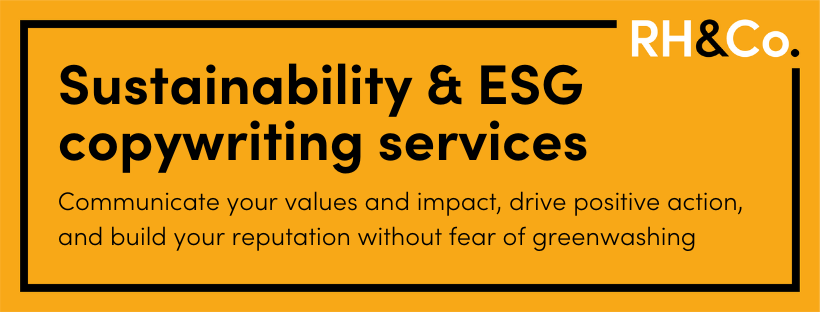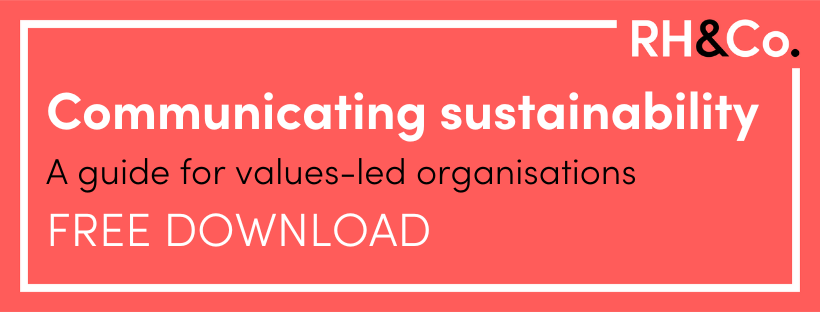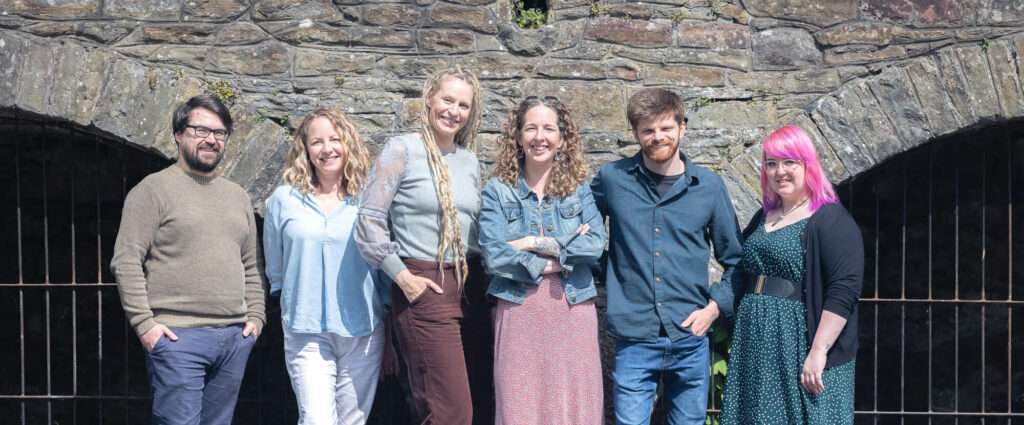

Positioning a brand on values – how to cut through the noise
Back in the day, positioning yourself as a green / ethical / sustainable (delete as appropriate) bank or fashion brand or consultancy practice was a relatively straightforward thing to do, assuming you could back it up in some way.
These days it’s not so easy. With everything from ESG regulations to the explosion of the B Corp movement, having social and environmental values is no longer a differentiator – there’s just too much noise.
As business advisor and author David C Baker wrote recently about purpose-driven agencies, “There are a thousand firms claiming that space, and thus it has become a distinction without a difference.” He goes on to say that he’s a big proponent of being-purpose driven, but adds, “It’s a good thing, but it is not positioning.”
So should you bring your brand values into your positioning? Can it be done effectively, and if so, how? And are there any alternatives?
TL:DR
- Just because it’s a feature, doesn’t mean it’s a brand
- From values to disruption: defining your cause
- Understand your value beyond your values
- In all things, show don’t tell
Just because it’s a feature, doesn’t mean it’s a brand
There are times when signalling a particular values-led product or feature is worth doing. For instance, a consumer will want to know if the toilet paper you’re selling is recycled or not, so by all means stick that on the packaging. But don’t be fooled into thinking that makes you Who Gives A Crap.
Who Gives A Crap oozes values from every pore. Not only is the product made of sustainable bamboo, they donate 50% of their profits to build toilets and improve sanitation in the developing world. They’re so passionate about their cause that one of their founders sat on a toilet in a warehouse and refused to move until their first £50,000 campaign was crowdfunded.
Crucially, because they were one of the first to really offer toilet paper that feels like a missional purchase, they could market it as exactly that.
However, if you were working at Andrex, and the company switched to using recycled fibres one day, you’d have a hard time convincing people you were the values-first choice. You’d be far better off sticking to your ‘soft as puppies’ message. Your recycled fibres alone would not give you the grounds to lead with a sustainability message.
By all means make ethical choices as a brand. But you only earn the right to build a value proposition around your ethics if they run uninterrupted through your business model.
As an aside: A glance at the Andrex site shows you their mission is “to leave a greener pawprint on our planet” which, while cute, doesn’t exactly ring true when you consider their parent company cut the use of recycled fibre from 29.7 in 2011 to 19.3% in 2021, and Ethical Consumer advised against buying their products in report published in May 2023.
To make this point with a B2B example, if you’re a commercial cleaning company and you use only environmentally friendly products, that’s absolutely something your clients might want to know. But it’s not enough to start marketing yourself as the green alternative.
By all means make ethical choices as a brand. But you only earn the right to build a value proposition around your ethics if they run uninterrupted through your business model. Because in this age of greenwashing, unless your values are near faultless, you’re going to be called out – or at the very least you’ll raise eyebrows from sceptical buyers (who might have given you a chance if you hadn’t embellished a feature and tried to hold it up as a sustainable brand).

From values to disruption: defining your cause
So let’s imagine you work for a business that can hand-on-heart claim to be values-first. The problem you’re facing now is that too many other businesses are trying to lead with the same message. They’re all using the same language.
Which means your value proposition needs to be built around a specific cause. You can’t just be a ‘people-first fashion brand’ or an ‘ethical HR tech platform’ or a ‘green manufacturer’. Be clear about how you’re disrupting your sector, whether that’s championing size and gender diversity, advocating for skills-based hiring to combat hiring bias, or making a circular economy possible in a given locality.
If you can’t go big with a values-led message, your best bet for cutting through the noise is not to shout but to let others infer what you stand for from your actions.
For instance, Tony’s Chocolonely have built their entire business on “making chocolate 100% exploitation free”, rather than pitching their brand as “the ethical chocolate company”, a phrase that feels shallow by comparison.
Making chocolate 100% exploitation free isn’t just Tony’s brand positioning, it’s their business model. More than 9.2% of their retail price goes to cocoa farmers – more than the Fairtrade premium – and they work directly with farmer cooperatives, ensuring that premiums reach individual farmers.
If your brand is similarly cause-based, it can act a little like disruptive companies in the tech industry. And your marketing can cut through the noise using a couple of disruptive principles:
- Change the rules of engagement, showing people a new idea is true or possible, e.g. ethical clothing can be affordable if we do it at scale (see Yes Friends – “…it costs as little as 10p extra per T-shirt to pay workers a living wage in India, and as little as £1.50 per tee for fairly traded organic cotton”).
- Show empathy before you sell. Assume the consumer or client wants to do the right thing and they’ve simply been working with a broken system until now – they’ve been navigating greenwashing and social-washing, and maybe getting disillusioned too.

If you’re changing the way an industry operates, you can afford to bring your cause into both your value proposition and your communications strategy. You can be like Patagonia and only ever run awareness-campaigns instead of product ads, or you can create reports that urge further change in the industry, or you can hone a message that flips people’s perceptions on their head.
Understand your value beyond your values
So what about the brands that are genuinely doing their bit for People and Planet as well as Profit but can’t quite claim to be disruptive frontrunners? Should you still try and position yourself around your values?
Let’s explore this using a set of three imaginary IT companies. You’re the customer or client trying to pick one.
- Option 01: Beige IT – Good performance, good price
- Option 02: Surprisingly Digital – Good performance, good price
- Option 03: Whatcha Gonna Do Consulting – Good performance, good price. Achieving a positive social impact.
Naturally you’d choose the more impactful business, PLT Consulting. However, we’re rarely in such a clear, clean cut scenario. You’re much more likely to encounter the following set of IT services companies:
- Option 01: Reed IT – Can probably meet your needs.
- Option 02: PLT Consulting – Can probably meet your needs, and the brand showcases a few ways it is green or sustainable or values-led.
If that’s all you’re choosing between, you’ll likely go for option 02. Until we add another company into the mix.
- Option 03: Performance Wave – Can deliver exactly what you’re looking for. They have made no claims about their values, but they seem perfect from a performance angle.
Suddenly PLT Consulting, the business that made a point about advertising their values, isn’t quite so appealing, is it? Those values have been overshadowed by the fact that Performance Wave can deliver exactly what you’re after.
Most of us want to make ethical choices wherever we can. But the truth is – unless a brand offers a disruptively ethical alternative – we’re rarely going to choose a company that appears to be values-based over a company that delivers exactly what we need. That’s true whether we’re talking about toilet paper or cloud infrastructure or legal services.
If your audience is primarily in the market for a HR consultant, you need to focus on how you’ve helped companies bring back their workforces from the brink. That doesn’t mean you shouldn’t talk about your fundraising efforts for your local conservation charity and your commitment to pay the Real Living Wage, but these things need to take a supporting role.
Because ironically, if you can’t go big with a values-led message, your best bet for cutting through the noise is not to shout but to let others infer what you stand for from your actions. Infuse your values throughout your marketing – share pics of your team doing charity work, create an impact report to showcase how you’ve been reducing carbon emissions – but don’t lean on them as central to your value proposition.
In all things, show don’t tell
So should you bring your brand values into your positioning? Only if it really is a central cause around which you’ve built your business, and which you can back up with evidence that even the most cynical aggressor would be hard pressed to deny.
Can values-based positioning be done effectively? Yes, if you go beyond generic terms like ‘sustainable’ and ‘green’, and hone your narrative around a clearly defined cause that runs clearly through your entire business model.
And are there any alternatives? Absolutely. Because we can’t all be Patagonia or Tony’s Chocolonely or Ecolab. But we can and should be infusing our values through all that we do. And, if we follow the ‘show, don’t tell’ rule, that can absolutely include our brand marketing.
For more on how to market your impact, read the first article in our series on sustainability and ESG, which is all about greenwashing vs. greenhushing.
Back to hompeage








